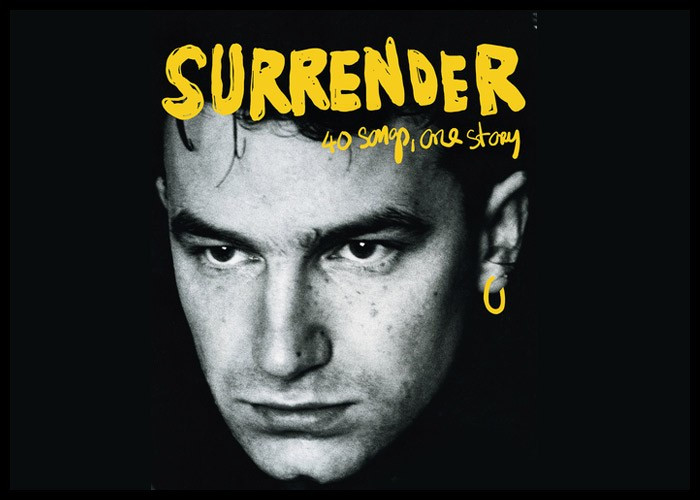Growing up as a teenager discovering U2’s The Joshua Tree, I recall an encounter that perfectly encapsulates the complex relationship some had with Bono and his band. After purchasing the album, I bumped into an older member of my church. His immediate reaction was hesitant, expressing uncertainty about U2 as he scrutinized the lyrics. Reading aloud from I Still Haven’t Found What I’m Looking For, he highlighted the lines:
I have spoke with the tongue of angels
I have held the hand of a devil
This anecdote illustrates a common sentiment: while U2’s Christian faith was evident, they were never strictly a ‘Christian band,’ a categorization that often provides comfort and easy understanding for some believers. This complexity is further explored in Bono’s autobiography, offering deeper insights into the man behind the music and the faith that informs his Bono Songs.
Bono’s autobiography, Surrender: 40 Songs, One Story, is more than just a rock star memoir; it’s a profound exploration of faith, social justice, and personal transformation, all interwoven with the narrative of one of the world’s most iconic bands. For fans of bono songs and those interested in the forces that shaped them, this book is an essential read. It’s a deeply personal account where Bono reveals the lasting impact of his mother’s early death, his personal insecurities, and the enduring strength of his marriage, all while navigating the extraordinary journey of U2.
The core themes of faith, transformation, and social justice, which resonate throughout Bono’s life and work, are also central to this autobiography. These threads provide a framework for understanding the motivations and inspirations behind many bono songs, offering fans a new lens through which to appreciate his musical contributions.
Faith as a Foundation for Bono Songs
Faith is undeniably a cornerstone of Bono’s life and artistic expression. As young men, Bono, Edge, and Larry Mullen were deeply involved with the Shalom Christian fellowship, a movement that emphasized a radical and demanding approach to faith. This early immersion in a fervent Christian environment profoundly shaped their worldview and early perspectives on music and faith. Following the release of their initial album and subsequent tour, Bono and Edge even contemplated leaving U2, believing that the demands of a rock band conflicted with a committed Christian life.
However, their manager, Paul McGuinness, intervened, challenging them to reconsider breaking their contractual obligations. It was the powerful song Sunday Bloody Sunday that ultimately solidified their path, demonstrating that they could articulate their beliefs and mission through their music. This pivotal moment underscored the potential for bono songs to be a vehicle for their faith, not an obstacle to it. The lyrics of Sunday Bloody Sunday, with lines like:
The real battle just begun
To claim the victory Jesus won
clearly illustrate this realization, marking a turning point in U2’s journey and the integration of faith into their artistic identity. Throughout Surrender, biblical references are woven into every chapter, highlighting the continuous fascination Bono holds for scripture and the central role faith plays in his life and, by extension, in many bono songs. Reflecting on his ongoing spiritual journey, Bono writes:
‘I return to a spiritual master like the apostle Paul…I have so much to learn from this ancient writer. How does someone who first shows up as a monumental pain-in-the-arse fundamentalist become someone who can write the greatest ode to love in two thousand years?’
This introspection reveals a deep engagement with faith that goes beyond surface-level religiosity, informing the depth and complexity found in many bono songs that grapple with themes of spirituality and human experience.
Social Justice: A Driving Force Behind Bono’s Music
Bono’s commitment to social justice is well-documented, and Surrender reveals the genesis and evolution of this passion. Bob Geldof played a crucial role in igniting Bono’s activism, drawing him into the anti-poverty movement. Shortly after Live Aid, Bono and his wife Ali volunteered in Ethiopia, an experience that profoundly broadened his understanding of global issues. From this point, his activism grew, leading to campaigns for Jubilee debt relief and the fight against the AIDS epidemic in Africa. These experiences not only shaped his philanthropic endeavors but also deeply influenced the themes explored in many bono songs.
In Surrender, Bono avoids self-aggrandizement, sidestepping the ‘over-worthiness’ criticisms he sometimes faced. Instead, he focuses on the pragmatic strategies required to achieve tangible progress in social justice. Understanding the power of impactful communication as a songwriter, Bono recognizes the need for a ‘hook’ and a compelling ‘top line’ to capture public attention and influence political leaders. This approach has led to collaborations with influential figures across diverse sectors, including Bill Clinton, George W Bush, Barack Obama, Rupert Murdoch, George Soros, and Bill and Melinda Gates. Bono emphasizes the critical role of relationships in achieving meaningful change:
‘You don’t have to agree on everything if the one thing you do agree on is important enough…the search for common ground starts with a search for higher ground.’
This perspective underscores a sophisticated understanding of how justice is achieved, moving beyond simplistic notions of celebrity advocacy. Bono insightfully notes:
‘And it turns out the fight for justice comes down to boring words that don’t look good on a T-shirt. Competence. Governance. Transparency. Accountability. Words that bring transformation. The non-shouty words. The quiet words that turn the world right side up.’
This nuanced understanding of social justice, focusing on practical action and systemic change, deeply informs the socially conscious messages embedded within many bono songs, making them resonate with a global audience concerned with equity and human rights.
Transformation: A Personal Journey Reflected in Bono Songs
Surrender is strikingly personal, marked by Bono’s self-awareness and candid reflections on his own character. He openly acknowledges his contradictions, describing himself as having ‘an ego far taller than my self-esteem’ and admitting to ‘having a big mouth and a foot that’s often in it.’ He frames this as a ‘struggle with the self’ and frequently expresses gratitude to his bandmates and family for their patience and support. This vulnerability offers a rare glimpse into the personal challenges and growth of a global icon, adding depth to the understanding of the transformative themes often found in bono songs.
It’s evident that Bono’s ambition and drive, while sometimes perceived as pushiness, have been crucial in propelling U2 to continually evolve and explore new artistic territories. He takes responsibility for missteps, such as the controversial decision to release their 2014 album Songs of Innocence for free via Apple iTunes, a move that automatically placed the album on 500 million accounts without explicit user consent. Reflecting on this, he observes:
‘If you are fronting a rock ‘n’ roll band, you need a bit of a messiah complex, but such a complex is less helpful for the antipoverty activist.’
This self-deprecating humor and willingness to confront his flaws contribute to the authenticity of Surrender, making it a compelling narrative of personal transformation that parallels the evolution and depth found in bono songs throughout U2’s career.
A Compelling Narrative for Fans of Bono Songs
At 550 pages, Surrender is an immersive read, yet it remains captivating from beginning to end. For those who appreciate U2’s music, especially bono songs that delve into deeper themes, this autobiography offers invaluable context and understanding. It’s not just the inspiring melodies that Bono crafts, but the profound insights into faith, social justice, and personal transformation that make his work so enduring. Reflecting on the importance of continuous renewal and inspiration, Bono writes:
‘The well of friendship can run dry in a family, a marriage, a community, a band. A good strategy for me is to continually go back to the source. To drop my bucket in the well in the hope of a refill. Why am I always talking abut the scriptures? Because they sustained me in the most difficult years of the band and they remain a plumb line to gauge how crooked the wall of ego has become.’
Surrender: 40 Songs, One Story is highly recommended for anyone seeking to understand the man behind the bono songs, offering a rich tapestry of faith, activism, and personal evolution that has shaped both Bono and his iconic music.


